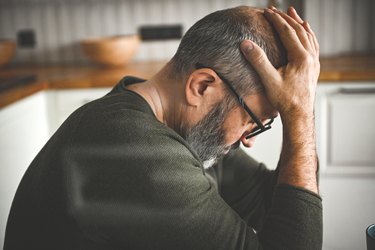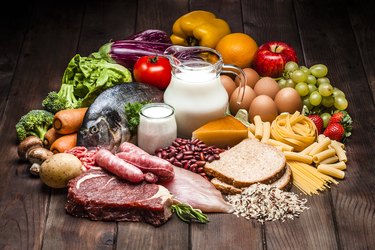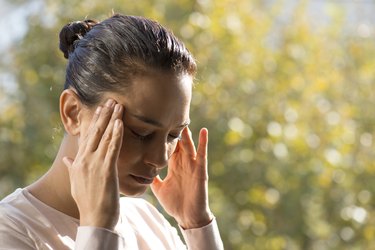
A healthy diet is a must when you're trying to lose weight. But what if your eating plan is giving you a headache?
Common weight-loss tactics can sometimes leave your head throbbing, particularly if you're not eating or drinking enough.
Video of the Day
Video of the Day
"Headaches can be a side effect of trying to lose weight, especially during crash weight-loss methods," says David Nazarian, MD, medical director of My Concierge MD, a weight-loss clinic in Beverly Hills, California. And it's hard to stick with healthy habits (like exercising and cooking wholesome meals) when your head hearts.
One bright spot: It's usually easy to figure out what dietary changes might be triggering your headaches. Here are five of the most common culprits and what you can do to feel better while still staying on track with your weight-loss goal.
1. You're Hungry or Have Low Blood Sugar
Not eating enough or skipping meals deprives your body of the fuel it needs to function properly, which can leave you feeling lousy. "If we don't have adequate food intake, we can develop hypoglycemia, or blood sugar lower than the standard range," Dr. Nazarian says. A hunger headache may also come with feeling dizzy, weak or irritable, he adds.
Fix It
Make sure you're taking in enough calories. While it's normal to have to trim your portions to lose weight, you shouldn't go too low. Cutting around 500 calories per day is a good place to start, according to the National Library of Medicine. Eating smaller, more frequent meals rather than saving all your calories for dinner also helps keep your blood sugar levels more stable, Dr. Nazarian says.
2. You're Dehydrated
Limiting your fluid intake, using diuretics to lose water weight or exercising vigorously and not replenishing the water you lost through sweat might make you dehydrated, which can easily trigger a headache. You'll also likely feel thirsty, dizzy, fatigued and might have a dry mouth, according to the Cleveland Clinic.
Fix It
Make it a point to drink plenty of water throughout the day. "You'll know if you need more water by monitoring the color of your urine. Light-colored urine means that you're likely drinking enough water, but dark-colored urine indicates dehydration," Dr. Nazarian says.
Water-rich foods like watermelon, oranges, celery, and cucumber count towards your fluid intake too, he adds.
3. You're in Ketosis
Recently started a low-carb diet? Drastically cutting carbs can send you into ketosis, when your body transitions to burning fat for energy instead of carbohydrates. Though experts don't fully understand the cause, the change "is often associated with brain fog as well as headaches," Dr. Nazarian says. You might also feel nauseated, tired, faint, dizzy or have an upset stomach.
Fix It
Ketosis symptoms, which are sometimes referred to as keto flu, tend to ease up on their own as your body adjusts to using fat for fuel. In the meantime, make it a point to get plenty of rest and drink lots of water, per Harvard Health Publishing.
4. You're Not Getting Enough of Certain Key Nutrients
Limiting your calorie intake can sometimes make it harder to meet your nutrition needs, which could contribute to headaches.
Falling short on magnesium (found in magnesium-rich foods like avocados, bananas and spinach) for instance, "makes our response system less equipped to deal with stress, which can result in headaches," Dr. Nazarian says.
Magnesium is a type of mineral called an electrolyte, which is involved in balancing the fluids in your body. Your new diet could have resulted in lower levels of other electrolytes, too — like sodium and potassium — which could contribute to headaches, according to the Cleveland Clinic.
Low iron can lead to headaches, too, because it's needed to produce red blood cells that transport oxygen to the brain. "If iron levels are low, not enough oxygen will be delivered to tissues including the brain, which may contribute to headaches," he adds. (Iron is found in red meat and leafy greens.)
Fix It
Eating a wide variety of whole foods can help you get the nutrients your body needs to function at its best, according to the National Institutes of Health (NIH). If you think you might have a nutrient deficiency, talk with your doctor. They can perform a blood test to confirm the deficiency and help you decide on the best way to correct it, which might include taking a supplement.
5. You Ate a Triggering Food
For some people, certain foods can trigger migraines, so you could be reacting to a food you recently added to your diet as part of your healthy eating plan. Per the Association of Migraine Disorders, possible culprits include:
- Aged cheeses
- Alcohol
- Artificial sweeteners
- Caffeine
- Chocolate
- Chickpeas
- Cured meats
- Dried fruits
- Fermented or pickled foods
- Lentils
- Licorice
- Meat tenderizers
- Peanuts and peanut butter
- Smoked fish
- Soy sauce
Fix It
If you think your headaches are being triggered by specific foods, consider keeping a food journal to track your symptoms and what you're eating each day. Once you've pinpointed potential offenders, you can try eliminating those foods from your diet to see if you have fewer headaches.
How to Prevent a Diet Headache
If you're struggling with a throbbing or pulsing head that you suspect is related to your weight-loss plan, there are a few things you can do to help keep the discomfort at bay. Here's what Dr. Nazarian recommends:
- Make sure you're eating enough calories. Here's how to figure out what you need.
- Avoid skipping meals. Healthy snacks can help you keep your energy and blood sugar up, too.
- Drink plenty of water. Your urine color is always a good guide to see whether you're getting enough. Or check this handy guide to how much water to drink.
- Consult with a registered dietitian. They can help you develop an eating plan to meet your weight-loss goals without unpleasant side effects like a headache.
When to See a Doctor
Talk to your doctor if your headaches are severe or if they're making it harder for you to go about your normal activities.
"Occasional headaches may not be unusual during weight loss, but if they become persistent or severe or are associated with symptoms of dizziness, changes in vision, nausea, vomiting or other neurological symptoms, it is advisable to seek medical attention promptly," Dr. Nazarian says.
- NLM: "10 Ways to Cut 500 Calories A Day"
- Harvard Health Publishing: "What Is Keto Flu?"
- National Institutes of Health: "Multivitamins—do you need one? And which one should you choose?"
- Association of Migraine Disorders: "Migraine Triggers"
- Cleveland Clinic: "Dehydration Headache"
- Cleveland Clinic: "Electrolyte Imbalance"
Is this an emergency? If you are experiencing serious medical symptoms, please see the National Library of Medicine’s list of signs you need emergency medical attention or call 911.


